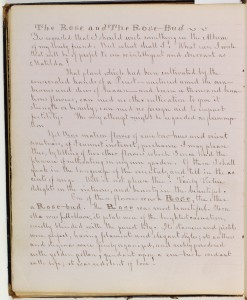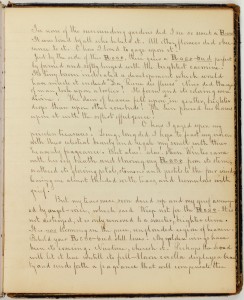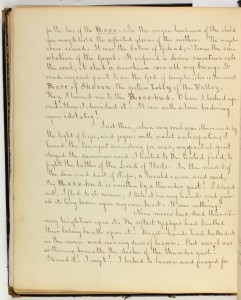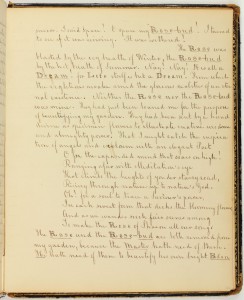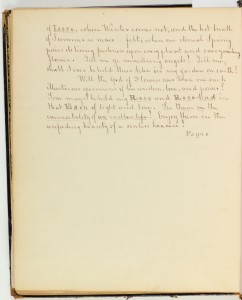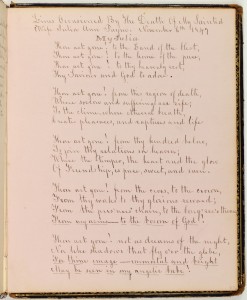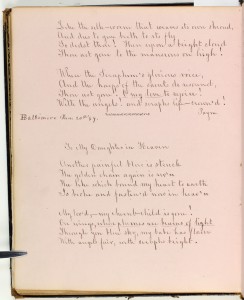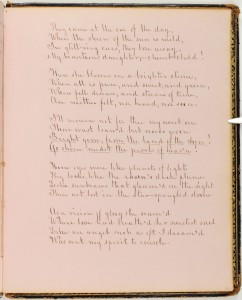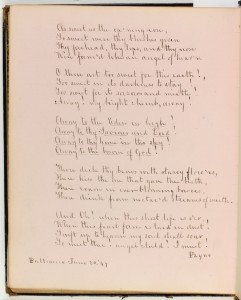Preface (3)
6|7|8|9|10|11-12|13|14|15|16|17|18|19|20|21|22|23|24|25|26|28|30|31|32|33
34|35|36|39|42|44|47|49|51|52|53|54|55|56|57|59|62| 63|64-68|70|73|75
The Rose and The Rose-Bud
Tis requested that I should write something in the Album of my lovely friend. But what shall I? What can I write that will be of profit to one so intelligent and observant as Matilda?
That plant which had been cultivated by the consecrated hands of a [unclear]—nurtured amid the sunbeams and dews of heaven—and born a thousand beauteous flowers, can need no other cultivation to give it strength or beauty; can need no foreign aid to fertility. The very attempt might be regarded as presumption.
Yet thou matron flower of rainbow hues and orient sweetness, if I cannot instruct; perchance I may please thee, by telling of two other flowers which I once had the pleasure of cultivating in my own garden. Of them I shall speak in the language of the orientals, and tell in the accents of song. Will it not please thee? Verily Virtue delights in the virtuous, and beauty in the beautiful.
One of these flowers was a Rose, the other a Rose-bud. The Rose was most beautiful. Its corolla was full-blown, its petals were of the brightest carnation, sweetly blended with the purest lily. Its stamens and pistils and stigmas were finely organized, and richly powdered with golden pollen, pendant upon a rose-bush verdant with life; it was redolent of love!
[65] In none of the surrounding gardens did I see so sweet a Rose. It was loved by all who beheld it. All other flowers did obeisance to it. O how I loved to gaze upon it!
Just by the side of this Rose, there grew a Rose-bud perfectly formed and softly tinged with the brightest carmine. Its tiny bosom indicated a development which would have made it indeed “La Riene [sic] des fleurs.” Never did the eye of man look upon a lovlier [sic]! Its form and its coloring were divine! The dews of heaven fell upon ^ it in gentler, brighter drops than upon other rosebuds! The Sun poured his beams upon it with the softest effulgence!
O how I gazed upon my priceless treasures! Long, long did I hope to feast my vision with their celestial beauty and regale my smell with thier [sic] heavenly fragrance. But alas! alas! stern Winter came with his icy breath and blowing my Rose from its stem, scattered its glowing petals, stamens and pistils to the four winds, leaving me almost blinded with tears, and tremulous with grief!
But my tears were soon dried up and my grief assuaged by angel-voice, which said Weep not for the Rose. It is not destroyed, it is only removed to a sweeter, brighter clime. It is now blooming in the pure, unclouded region of heaven. Behold your Rose-bud still lives! My golden wings have been its covering. Nurture, cherish it. Perhaps the Lord will let it live untill [sic] its full-blown corolla displays a beauty and sends forth a fragrance that will compensate thee [65 (reverse)] for the loss of the Rose. In the virgin loveliness of the child you may behold the reflected glories of the mother. The angel-voice ceased. It was the balm of Gilead—‘Twas the consolation of the Gospel. It infused a divine sweetness into the soul, it shed a sunshine over all my being. It made my soul pant to see the God of Angels, who is the sweet Rose of Sharon, the spotless Lily of the Valley. Then I turned me to the Rose-bud. O how I looked up on it! How I cherished it! It was a love bordering upon idolatry!
Just then, when my soul was illumined by the light of hope, and joyous with sweet anticipation; I heard the trumpet sounding for war, my partial [?] spirit obeyed the summons and I hasted to the tented field, to fight the battles of the Lord of Hosts. In the midst of the din and dust of strife, a herald came, and said, thy Rosebud is smitten by a thunder gust! I delayed not, I fled to its rescue; I took it in my hands and pressed its tiny bosom upon my own breast. It was withering!
Nine moons had shed thier [sic] silvery brightness upon it! The softest zephyrs had breathed thier [sic] balmy breath upon it! Angel-hands had bathed it in the morn and evening dews of heaven. But now it was withering beneath the stroke of the thunder gust! I kissed it! I wept! I looked to heaven and prayed for [66] succor. I said Spare! O spare my Rose-bud! I turned to see if it was reviving. It was withered!
The Rose was blasted by the icy breath of Winter, the Rose-bud by the hot breath of Summer. Nay! Nay! It is all a Dream! For Life itself is but a Dream! From which the righteous awake amid the glorious realities of an eternal existence. Neither the Rose nor the Rose-bud was mine. They had just been loaned me for the purpose of beautifying my garden. They had been sent by a hand divine as specimen flowers to illustrate creative wisdom and almighty power. That I might catch the inspiration of angels and exclaim with an elegant Poet
O for the expanded mind that soars on high!
Ranging afar with Meditation’s eye
That climbs the heights of yonder starry road,
Rising through nature up to nature’s God.
Oh! for a soul to trace a Saviour’s power,
In each sweet form that decks the blooming flower,
And as we wander such fair scenes among
To make the Rose of Sharon all our song.
The Rose and the Rose-bud are both removed from my garden, because the Master hath need of them. He hath need of them to beautify his own bright Eden [66 reverse)] of Love, where Winter comes not, and the hot breath of Summer is never felt; where one eternal Spring pours its living freshness upon every plant and every smiling flower. Tell me ye ministering angels! Tell me, shall I ever behold thier [sic] like in my garden on earth?
Will the God of Flowers ever loan me such illustrious specimens of his wisdom, love, and power? Soon may I behold my Rose and Rose-bud in the Eden of light and love. See them in the immortality of an endless life! Enjoy them in the unfading beauty of a sinless heaven!
Payne
[67]
Lines Occasioned by the Death of My Sainted Wife Julia Ann Payne. November 6th 1847
My Julia
Thou art gone! to the Land of the blest,
Thou art gone! to the home of the pure,
Thou art gone! to thy heavenly rest,
Thy Savior and God to adore.
Thou art gone! from this region of death,
Where sorrow and sufferings are rife;
To the clime, whose ethereal breath,
Creates pleasures, and raptures and life
Thou art gone! from thy kindred below,
To join thy relations in heaven;
Where the temper, the heart and the glow,
Of Friendship, is pure, sweet, and even.
Thou art gone! from the cross, to the crown,
From thy works to thy glorious reward;
From the pris’ners’ chain, to the Conq’rer’s throne,
From my arms—to the bosom of God!
Thou art gone! not as dreams of the night,
Nor like shadows that fly o’er the globe,
For thine image—immortal and bright
May be seen in my angelic babe!
[67 (reverse)]
Like the silkworm that weaves its own shroud,
And dies to give birth to its fly
So didst thou! Then upon a bright cloud
Thou art gone to the mansions on high!
Where the Seraphim’s glorious voice,
And the harps of the saints do resound,
Thou art gone! O my love to rejoice!
With the angels! And seraphs life-crown’d!
Baltimore June 20th ’49. Payne
To My Daughter in Heaven
Another painful blow is struck
Another golden chain again is riv’n
The like which bound my heart to earth
Is broke and fasten’d now in heav’n
My lov’d,—my cherub child is gone!
On wings, whose plumes are beams of light
Through yon blue sky, my babe has flown
With angels fair, with seraphs bright.
[68]
They came at the eve of the day,
When the sheen of the sun is mild,
In glitt’ring cars, they bore away,
My beauteous daughter,—cherub child!
There she blooms in a brighter clime,
Where all is pure, and sweet, and green,
Where fell disease, and storms of time,
Are neither felt, nor heard, nor seen.
I’ll mourn not for thee my sweet one
Thou wast loan’d but never given
Bright gem, from the land of the Sun!
Go shine midst the jewels of heav’n!
Thine eyes were like planets of light
Thy locks, like the raven’s dark plume
Like sunbeams that gleam’d on the sight
Thou art lost in the star-spangled dome
As a vision of glory she seam’d [sic]
Where love had breath’d her sweetest soul
Like an angel such as oft I dream’d
Was sent my spirit to console.
[68 (reverse)]
As sweet as the op’ning rose,
So sweet were thy blushes given
Thy forehead, thy lips, and thy nose
Were form’d like an angel of heav’n
O thou art too sweet for this earth!
To sweet in its darkness to stay!
Too sweet for its sorrows and mirth!
Away! my bright cherub, away!
Away to the Eden on high!
Away to thy Saviour and Lord!
Away to thy home in the sky!
Away to the bosom of God!
There deck thy brows with starry flow’rs,
There kiss the one that gave thee birth,
There roam in ever-blooming bowers,
There drink from nectar’d streams of mirth.
And Oh! when this short life is o’er,
When this frail form is laid in dust!
Swift up to heaven my soul shall soar
To meet thee! angel child! I must!
Baltimore June 20, ’49 Payne
Religious leader and educator Daniel Alexander Payne contribution is the longest entry in the Cassey album. The allegorical narrative commemorates his wife, Julia Ann Payne, and their infant daughter, in addition to two elegies that address their deaths directly. According to his 1888 memoir Recollections of Seventy Years Payne first met Amy Matilda Cassey in 1835, while traveling through Philadelphia, where he became acquainted with “Mr. Joseph Cassey, a colored manufacturer of wigs and other hair-decorations, who had retired on a fortune of about $75,000, with a lovely wife and five children.” Payne’s entry dated 1849 and annotated Baltimore, suggests Cassey brought her album with her when she traveled to his city of residence.
“The Rose and the Rose-Bud” portrays Payne’s wife and child as flowers in a garden. They are meticulously described as flowers complete with corolla, stamens, pistils, stigmas, and pollen, while also retaining human attributes (a “tiny bosom” and a fragrance “redolent of love”). The allegory focuses on their death and acknowledges that the rose (his wife) and the rosebud (his daughter) were only loaned to him by God, who has reclaimed them. He furthers the eulogy with the poem “On Visiting the Grave of Hervey”by the English clergyman Legh Richmond. He tellingly uses an abridged version previously published in a botany textbook by the American educator Almira Hart Lincoln Phelps. Despite the speaker’s efforts to convince himself that God needs the rose and the rosebud “to beautify his own bright Eden,” his pressing final questions, as well the increasing number of underlined words, end the allegory on a haunting note of despair.
“Lines Occasioned by the Death of My Sainted Wife” reverses conventional metaphors represent earth as a “region of death” and heaven as one of “life.” In juxtaposition to most of the other album entries, Payne depicts heaven as the domain of true “Friendship” . “To My Daughter in Heaven” continues the floral imagery of “The Rose and the Rose-Bud” representing Payne’s daughter as an “op’ning rose” who was “too sweet for this earth.” In portraying the deceased as flowers, Payne invests the ubiquitous allusions and illustrations of flowers in the Cassey Album with a melancholy significance.
Of further relevance, Payne’s also kept a series of albums as noted in his memoir. He frequently notes friends and acquaintances who wrote in Cassey’s, including Patrick Henry Reason, Robert Forten, brother of Margaretta Forten, Sarah Forten Purvis, and Mary Forten, album also wrote in his. He often transcribes their entries and these recollections testify to the importance of albums as sites of social networking. When Payne arrived as a seminary student at the Evangelical Lutheran Church in Gettysburg, Pennsylvania, he forgot his letters of introduction but presented his album in their place. The head of the seminary told him approvingly, “Sir, you might travel round the world with this album, without any other testimonial to your character.”

